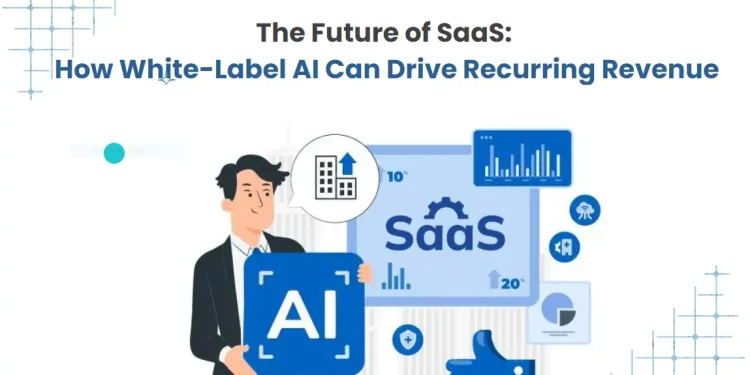Introduction
People expect AI technologies in every field. Saas companies are not an exception, hence, it is a must-have for them. As customers anticipate automation and data insights for a personalized experience.
However, building in-house AI requires time and money. Many businesses can’t afford long development cycles or expensive infrastructure.
White-label AI can solve this problem. It allows SaaS companies to license ready-made AI tools. They can customize these tools according to their requirements and launch quickly. This approach reduces costs and allows businesses to scale AI as they grow.
We know that white-label AI makes AI adoption faster and more affordable. But what is the future of SaaS? Can white-label drive recurring revenue? To know the answers, continue reading this blog.
Evolution of SaaS
Traditional SaaS models supported one-time purchases of software. But now businesses can access them through cloud-based subscriptions. Companies don’t need to install software on individual devices anymore. They can update software remotely, ensuring users have the latest features without manual installations. This has reduced IT costs and improved scalability.
The development of AI-powered SaaS solutions took place due to the growing businesses’ demand for automation and intelligent features. Companies needed advanced tools for data analysis and workflow automation. These AI tools can also provide insights.
AI-driven SaaS platforms are known to offer automated customer support and intelligent analytics. This can improve efficiency at an affordable price. These refinements further help SaaS providers to differentiate between their offerings and attract long-term customers.
Understanding White-Label AI and Its Role in SaaS
Nowadays, people prefer using SaaS integrated with AI. The reason behind it is that it offers an efficient solution that does not require much effort. Hence, AI has grown to become essential for SaaS companies that want to remain competitive. But before going into any nitty-gritty, let’s understand what white-label AI is.
What is White-Label AI?
White-label AI is a third-party AI solutions that develop AI tools from scratch. SaaS companies can use those AI solutions to integrate and rebrand as their own. They include chatbots and automation tools. They provide predictive analytics and AI-driven data insights that can be used for the development of companies. SaaS providers can also use the white-label AI to provide improved solutions without investing anything in the in-house AI development.
Why SaaS Companies Are Adopting White-Label AI
In-house AI development requires skilled talent and time. It comes with high costs and long development cycles. White-label AI allows SaaS companies to implement AI-driven features quickly and efficiently. Saas companies can license and customize AI tools to keep providers competitive without maintaining complex AI infrastructure.
Key Benefits of White-Label AI
The key benefits of white-label AI range from seamless brand integration to faster market entry. So, let’s see more on it:
- Faster go-to-market: Companies can launch AI-powered features without months of development.
- Lower infrastructure costs: Companies won’t need expensive machine-learning models or high-performance computing.
- Scalability: Businesses can expand AI capabilities as customer demand grows without major upgrades.
White-label AI allows SaaS companies to launch features quickly without big investments. These advantages can help businesses to retain customers and create steady revenue.
The Future of SaaS: How White-Label AI Can Drive Recurring Revenue
The future of SaaS is certainly evolving rapidly. And white-label AI is at the forefront by driving recurring revenue in SaaS. But how? This is exactly what we will be discussing in this section.
AI Integration as a Standard in SaaS
AI-driven SaaS has now become the standard among customers. It functions as a core component of SaaS platforms by enabling automation and data analysis. Further, it provides personalized user experiences that can improve engagement. AI-driven features in SaaS can reduce manual work and enhance decision-making. Hence, as a SaaS provider, if you fail to integrate AI risk, you might end up losing customers to your competitors who offering smarter automated solutions.
White-label AI also allows SaaS companies to add advanced AI capabilities without spending years on development. Providers can integrate chatbots and predictive analytics without hiring expensive AI specialists. This approach helps businesses enhance their platforms quickly while focusing on their core products and services.
AI-powered features increase customer retention and drive consistent revenue through subscription renewals. Businesses using AI see higher engagement and greater long-term value from their users. SaaS providers that use white-label AI can scale faster and improve customer satisfaction. This enables them to maintain a competitive edge in a growing market.
Enhanced Customer Engagement
Saas users are aware of AI integration and their features. Hence, they expect fast and seamless interactions across platforms. AI-powered automation provides personalized support to customers by enabling chatbots and predictive analytics. This has enhanced customer engagement. These features help businesses respond instantly to user needs and reduce frustration caused by slow or ineffective support.
White-label AI allows SaaS providers to add AI-driven engagement tools, such as a white-label chatbot, without building them from scratch. Companies can integrate AI chatbots and smart recommendation engines without hiring specialized AI teams. This reduces development costs while improving user experience through more relevant interactions.
AI-powered engagement tools help businesses retain customers and increase revenue. Automated support and personalized recommendations improve user satisfaction. Companies using AI-driven automation see higher subscription renewals and stronger customer loyalty.
Cost-Effective Development
Building AI solutions from scratch needs skilled developers. It includes high infrastructure costs and long development cycles. Many SaaS companies struggle to allocate resources for AI. This also diverts their attention from delivering core product offerings. The companies can’t afford delays in AI implementation, as it can result in missed market opportunities and slower revenue growth.
White-label AI provides ready-made solutions that SaaS companies can customize and deploy quickly. They can quickly integrate these features in a week rather than spending months on development. This approach reduces development costs while allowing providers to enhance their platforms with minimal technical effort.
Companies that deploy fast see quicker monetization. SaaS providers that integrate AI early can meet customer demand and improve retention. White-label AI helps businesses adapt to market trends and scale efficiently. They drive recurring revenue without the delays and expenses of in-house AI development.
Enhanced Personalization
SaaS users anticipate platforms to tailor experiences tailored according to their specific needs. Generic solutions no longer keep users engaged. Businesses demand AI-driven insights that improve efficiency and decision-making. Personalization helps companies to satisfy customers by delivering relevant recommendations and customized user interfaces.
White-label AI allows SaaS providers to integrate personalization features without heavy development efforts. AI-powered recommendation engines and adaptive interfaces can be implemented into an existing platform. It can improve user experience without requiring in-house AI teams. These enhancements create engaging interactions, thus making products more valuable to customers.
Personalized experiences build interest in customers and retain them for a longer period. Users are more likely to continue their subscriptions when the software adapts to their needs. SaaS providers that use AI-driven personalization see stronger engagement and improved customer loyalty.
Scalability and Flexibility
The integration of AI with SaaS solutions should be able to meet customers’ increasing demands. This can be achieved by expanding AI capabilities within a SaaS platform. However, this requires significant infrastructure upgrades and skilled development teams.
Businesses face challenges in maintaining system performance and managing growing datasets. This might hinder the user experience as customer demand increases. Scalable solutions will reduce the risk of bottleneck performance and rising operational costs.
White-label AI provides a scalable and flexible approach to AI integration. These solutions allow SaaS providers to add advanced AI features to their existing infrastructure. They adapt seamless performance even with growing user bases. This ensures consistent performance across different customer segments. Businesses can scale AI-powered features without expensive technical investments.
Scalability reduces operational costs per user, thus increasing profits. SaaS providers can support more customers without proportionally increasing expenses. Companies can use white-label AI to maintain performance and optimize resources. This overall approach will drive long-term recurring revenue as their platforms grow.
Tiered Pricing Models
SaaS companies no more offer only the fixed-price models. They are shifting towards flexible, value-based models that align with customer needs. Businesses prefer scalable AI features with usage-based pricing. This ensures customers only pay for what they use. This approach makes AI adoption more accessible while maximizing the value customers receive from SaaS solutions.
White-label AI simplifies the implementation of tiered pricing without requiring extensive development. SaaS providers can introduce AI-powered features at multiple pricing levels, allowing customers to upgrade as their needs grow. Usage-based billing and enterprise AI customization further enhance revenue opportunities, making AI solutions more accessible to businesses of all sizes.
This approach of AI pricing strategy helps SaaS providers increase recurring revenue and improve customer retention. Offer premium AI add-ons and subscription-based models to raise the average revenue per user (ARPU). Provide customized products and pricing based on different customer segments. This helps businesses to maintain a steady income while scaling their AI offerings efficiently.
Access to Advanced Features
More companies are now using AI-led White-label solutions to achieve operational efficiencies. The features, like predictive analytics and automation, help companies to eliminate noise and make data-led decisions.
White-label AI allows SaaS providers to integrate sophisticated AI features without heavy investment in research or development. After companies obtain access to pre-trained solutions, they can then focus on quickly innovating product development without the burdens of creating the AI model from scratch. Ultimately, this equips SaaS firms to compete and offer exceptional AI products to clients.
Adding sophisticated AI-enabled offerings increases premium pricing models, as customers generally pay higher prices for higher plan tiers that have additional features based on their predicted or automated outcomes. Predictive analytics and automation as part of subscriptions can provide a channel to facilitate better average return per user (ARPU) results. White-label AI allows SaaS businesses to offer customers increased overall value, both perceived and actual, while obtaining operational efficiencies.
Focus on Core Competencies
Building White-label AI solutions in-house requires extensive expertise, time, and resources. This can lead to the shift of the focus away from a company’s primary strengths. As it might further result in slow product development and reduce efficiency.
White-label AI enables SaaS companies to integrate AI capabilities without diverting attention from their core business. Instead of investing in AI research, businesses can adopt pre-built solutions tailored to their needs. This approach accelerates innovation while allowing teams to focus on improving user experience and industry-specific functionalities.
Additionally, the prioritization of core competencies can lead to sustainable business growth and a more competitive market position. Companies that understand this and work on leveraging white-label AI can enhance their offerings while maintaining efficiency. By avoiding unnecessary complexity, SaaS providers can retain customers and drive long-term recurring revenue.
Conclusion
In conclusion, white-label AI is transforming the SaaS industry by enabling faster deployment, improved customer engagement, and scalable AI-driven features. Businesses that adopt these solutions can gain access to advanced capabilities without the complexities of in-house development.
White Label AI-powered personalization and predictive analytics in SaaS also help companies to enhance their user experience while increasing recurring revenue. It means integrating AI is no longer optional. It is essential for long-term competitiveness.
As the SaaS market is evolving, providers must leverage White Label AI-driven solutions to attract and retain customers. It also offers a cost-effective way to enhance product offerings without delaying time-to-market.
Companies that embrace White Label AI will sustain growth while improving operational efficiency and maximizing customer lifetime value. Moreover, by adopting a strategic White Label AI approach ensures long-term profitability. SaaS providers that leverage white-label AI can scale faster, meet market demands, and establish a strong competitive edge in an increasingly AI-driven landscape.





